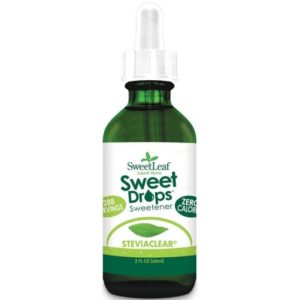The best stevia of 2023 will be the one that works for your needs. Several brands offer good-quality sweeteners if you prefer liquid, powder, or packets. This article will help you choose the right kind and brand of stevia so that your next purchase is informed.
What is Stevia?
Stevia is a naturally sweet herb used as a sweetener in other countries for hundreds of years. It is 100-300 times sweeter than sugar but has no calories. It can replace sugar in foods and drinks without changing flavor or texture. The FDA has approved 3 extracts of stevia as “Generally Recognized As Safe” (GRAS). Rebaudioside A (Rebiana), stevioside, and rebaudioside B are all found in the plant leaves after they are dried or ground into powder form. Most people tolerate stevia well, but there are some rare allergic reactions to it, so you should always check with your doctor before taking any nutritional supplements or adding them to your diet plan if you suffer from any other medical conditions such as diabetes or high blood pressure.
Sugar substitutes like stevia are often used in low-carb or diabetic diets because they can help control blood sugar levels and even eliminate certain health conditions like diabetes.
Stevia is an herb used as a sweetener in other countries for hundreds of years.
Stevia is a sweetener that comes from the leaves of the stevia plant. It has been used as a sweetener in other countries for hundreds of years. The stevia plant grows in South America and some parts of North America.
Best Stevia of 2023
For baking, the best stevia is Raw Organic Stevia Powder. This product contains a blend of stevia leaf extracts and pure cane sugar, so it can be used in any recipe that calls for sugar.
You could use liquid or powdered stevia extract in coffee drinks to add sweetness without adding calories. If you prefer tea over coffee (and who doesn’t?), try Pure Via Liquid Stevia Extract Sweetener with no calories or carbs added to your drink!
If you think about sweetening food or desserts, many options are available that contain no sugar! One option is Monk Fruit In The Raw Sweetener, which uses monk fruit extract rather than artificial ingredients like sucralose-meaning. It won’t upset your stomach if consumed in large quantities like other sweeteners. Over time…or should I say “will.”
Ranking the Best Stevia of 2023
1. SweetLeaf Sweet Drops
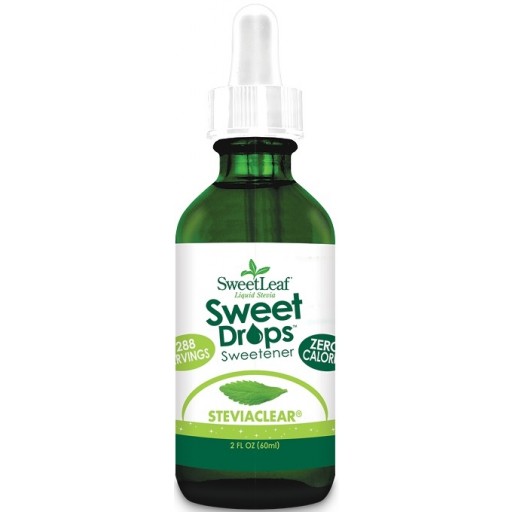
SweetLeaf Sweet Drops are a delicious, natural, zero-calorie way to flavor your food and drinks. These drops contain our proprietary Reb A sweetening ingredient, a naturally derived stevia that tastes just like sugar, with zero calories or artificial ingredients. SweetDrop Sweeteners can be used in all of your favorite recipes and drinks! They’re great for baking marinades, cold beverages, hot beverages, yogurt, and ice cream.
SweetLeaf Sweet Drops Liquid Stevia Sweetener is a natural, low-calorie sweetener made from the stevia plant. This zero-calorie, non-glycemic sweetener is ideal for those watching their weight or who are concerned about blood sugar management and need to eliminate or reduce the amount of refined sugar they consume.
2. Kiva Organic Stevia
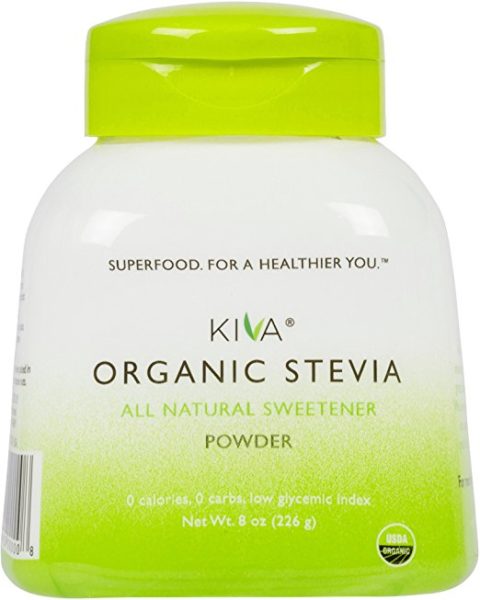
Kiva Organic Stevia is a 100% pure, zero-calorie, natural sweetener that can easily add sweetness and flavor to your food and drinks. Stevia is naturally derived from the leaf of the Stevia rebaudiana plant. The extracts are up to 300 times sweeter than sugar, so only small amounts are needed. It’s perfect in coffee, tea, smoothies, and yogurt, plus it makes adding sweetness to baked goods easy by dissolving into liquids without granulating or crystallizing. Organic stevia powder is an excellent option for those with diabetes interested in reducing their daily caloric intake as it has zero impact on blood glucose levels.
3. NOW Better Stevia
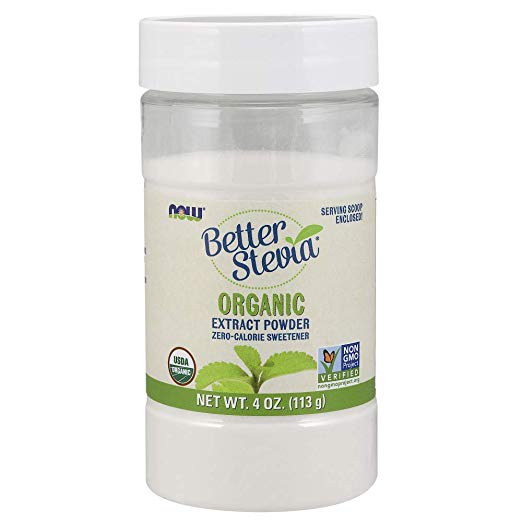
NOW Better Stevia is the only stevia sweetener that doesn’t leave a bitter aftertaste. It’s been triple-purified to remove chlorophyll, which means it’s better tasting and better for you. Swear off artificial sweeteners and choose NOW Better Stevia, the better-tasting stevia sweetener of your choice!
4. CCnature Organic Stevia Powder
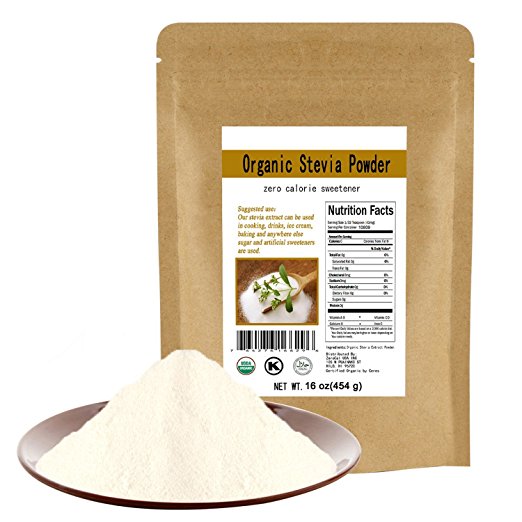
Check the price at Amazon.
If you are sensitive to artificial sweeteners and want to cut back on refined sugars, CCnature Organic Stevia Powder is a great choice. With zero calories and a natural taste, stevia powder is a great way to add natural sweetness to your favorite drinks and snacks. Or use it in cooking and baking—it’s more concentrated than most varieties and dissolves well in liquids.
5. Natural Mate Stevia
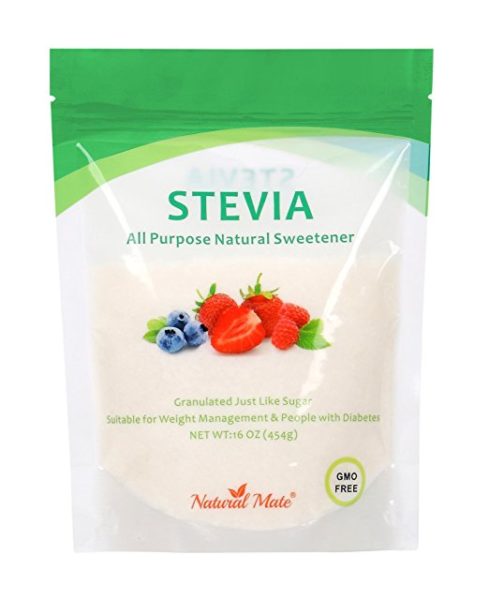
Natural Mate Stevia is made from the South American stevia plant leaves. Unlike other artificial sweeteners that taste bitter and metallic, some with a lingering aftertaste, our sweeteners have zero calories and have a clean, natural sweetness.
Natural Mate Stevia is made from the stevia plant, which is naturally sweet. Use it to add a touch of sweetness to any dish or drink.
6. Truvia Naturally Sweet
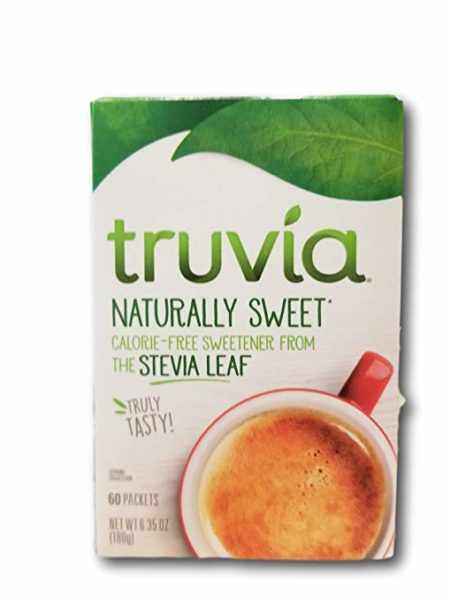
Truvia Naturally Sweet is our sweetener of choice when baking, cooking, or adding to coffee or tea. Made with 100% stevia leaf extract and a blend of erythritol and rebiana, it’s naturally calorie-free, has zero carbs, and has no artificial ingredients. Recipe ideas include sprinkling on fresh fruit or drinking your favorite beverage. Truvia also comes in granulated form for baking and creating delicious treats at home.
7. Stevia Select Sweetener
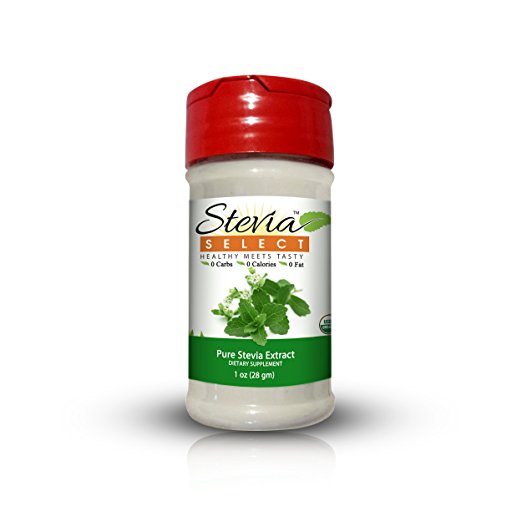
Stevia Select Sweetener is an organic stevia extract that comes in a tiny one-ounce container.
If you use stevia regularly, you’ll probably want to opt for a larger container. Still, it’s a good option for occasional users or people who need a travel-sized container for sweetening drinks without sugar while on the go.
8. Mommy Knows Best Pure Stevia
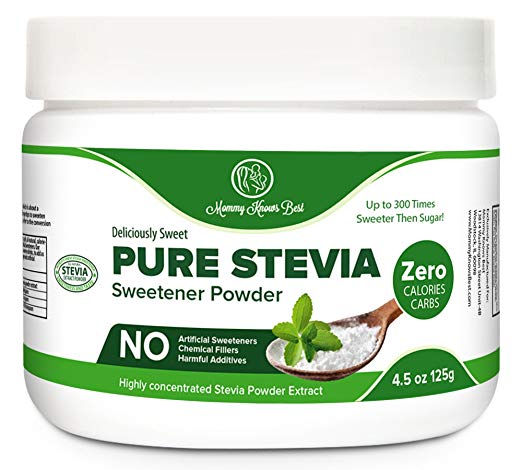
Mommy Knows Best. Pure Stevia comes in a three-ounce tub that’s well-suited for sweetening tea and coffee but isn’t large enough for baking and cooking.
It’s got a sweet and well-balanced taste, but the only drawback for some people will be the lack of organic certification.
9. Stevia in the Raw
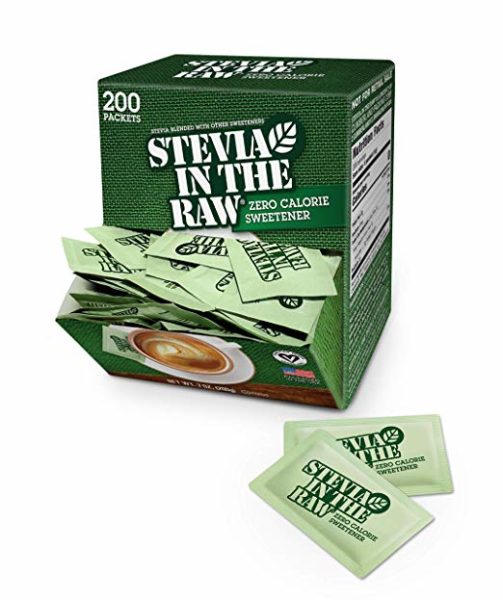
Stevia in the Raw is popular and well-liked, but it is not the purest stevia extract on the market.
It uses a combination of maltodextrin and stevia extract, which means the powder is somewhat less sweet and more blandly flavored than pure stevia.
10. KAL Sure Stevia
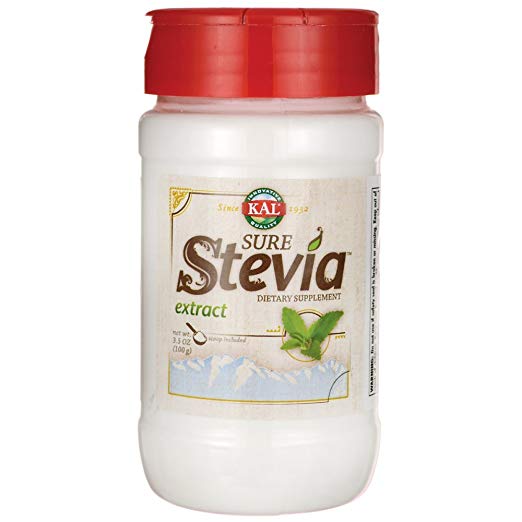
A clean, zero-calorie natural sweetener, KAL Sure is an all-natural stevia product that tastes like sugar. With zero calories, no bitter aftertaste, and safe to eat straight from the packet or add to any recipe, you can easily use KAL Sure Stevia to lower your calorie intake or people with diabetes looking for a natural sweetener. Vegan and gluten-free, this product is a great way to add taste without adding the extra carbs!
Who Should Buy Stevia?
Stevia is the most popular natural sweetener in the world, but it’s also one of the most misunderstood. That doesn’t mean that Stevia isn’t great—it is! But there are some things you should know before you buy it (or don’t).
Diabetics
If you have diabetes, stevia is an excellent sweetener for baking. Nutritionists often recommend Stevia as an alternative to sugar and artificial sweeteners, especially for those with diabetes. Stevia can be used instead of sugar in many foods and drinks, but it’s best if you don’t use too much at once; like any other type of food or drink that contains calories and carbohydrates, too much may raise your blood sugar levels over time.
One advantage of using stevia is that it’s natural: the leaves are harvested from plants grown worldwide and processed into liquid or powder before being sold in stores as natural sweeteners. This means that no chemicals have been added during manufacturing—a big plus for those who suffer from allergies!
People watching their weight
Stevia is a natural sweetener that has no calories. It’s an excellent alternative to sugar and artificial sweeteners, as it does not raise blood sugar levels like other sweeteners. Stevia is also safe for diabetics and children, so if you’re watching your weight or have kids trying to avoid sugar, stevia can be a great option!
Anyone tired of artificial sweeteners
If you’re tired of artificial sweeteners like aspartame, sucralose, and acesulfame potassium (collectively known as “artificial sweeteners”), stevia may be a good option. While all three of these artificial sweeteners have been associated with adverse health effects in some studies, the most common reason to avoid them is that they can cause weight gain by triggering cravings for more food. One study found that rats fed stevia lost weight compared to those fed artificial sweeteners!
The other primary concern about many artificial sweeteners is their potential link to cancer — especially brain cancer. This is an issue because cancer cells often have receptors for both glucose and fructose: two molecules commonly found in natural (non-artificial) sugars such as sucrose or high-fructose corn syrup (HFCS). It’s possible these receptors could play a role in how certain cancers grow and spread throughout the body — which could explain why there appear to be links between various kinds of cancer and consuming products containing large amounts of HFCS or liquid versions of sucrose.
Finally, some people who use artificial sweeteners notice headaches after consuming them—perhaps because they lack specific vitamins such as thiamine that are normally present when consuming regular sugar (sucrose).
Stevia is a great natural sweetener
It is a natural sweetener that people with diabetes can use, those on a diet, and anyone who wants to be healthier. Stevia has no calories and has no impact on blood sugar levels.
It is a good sugar alternative for people with diabetes or anyone watching their weight. It also helps reduce plaque buildup in the arteries due to its anti-inflammatory properties.
Health benefits of Stevia
Stevia is a natural sweetener used for hundreds of years in South America. It was first discovered by the Guarani Indians, who called it “k’heri.” They took advantage of its sweetness by using it as a substitute for sugar and honey. It is made from the stevia plant leaves and contains zero calories, making it ideal for those watching their weight or diabetes patients who need to keep a low glycemic index diet.
Stevia is calorie-free.
Stevia is calorie-free, which means it can sweeten your food and drinks without adding any calories. It’s also a zero glycemic index sweetener, so it won’t spike your blood sugar levels or make you hungry soon after eating.
Because stevia is natural and plant-based, no additives or chemicals are involved in its production. This makes it an ideal choice for people with diabetes and other health conditions who want to monitor their added sugar intake while still enjoying their favorite treats!
Stevia is a zero glycemic index sweetener.
Stevia is a great sweetener to use if you have diabetes or are diabetic. As Dr. Mercola explains, it is a zero glycemic index sweetener that does not cause a spike in blood sugar levels.
It helps treat diabetes.
Stevia can also help fight against diabetes, a disease that affects the body’s ability to produce or use insulin. When you have diabetes, your body doesn’t produce enough of this hormone, which causes your blood sugar levels to rise, leading to serious health complications. However, stevia has been shown to help regulate blood sugar levels and improve insulin sensitivity. This, in turn, helps lower blood pressure and cholesterol levels, decreases triglycerides (a type of fat found in your blood), and reduces the risk of developing heart disease and kidney disease as well as eye disease (retinopathy).
It helps improve oral health.
It can help reduce tooth decay. It’s been shown to prevent cavities and keep your teeth healthy, which is why it’s often added to mouthwashes and toothpaste.
It will help keep your gums healthy. Research suggests that stevia may reduce the risk of gingivitis, or inflammation of your gum tissue—a significant cause of tooth loss, according to the American Dental Association (ADA). The researchers believe this is because stevia has anti-inflammatory properties. Plus, it tastes sweet like sugar but doesn’t have any calories! That means no more cavities from eating too many sweets!
It helps treat obesity.
According to several studies, stevia can help you lose weight by making you feel fuller for longer. Stevia is also a natural, calorie-free sweetener, which makes it an excellent sugar substitute. Unlike many other non-sugar sweeteners, it does not affect your blood sugar levels or trigger cravings for more food like other artificial sweeteners.
Another study shows that using stevia to replace sugar in foods can significantly lower body weight and triglyceride levels.
It fights cancerous cells.
You may have heard stevia is a natural sweetener that can help with weight loss and diabetes, but did you know it also has anti-cancer properties? Stevia is effective against the growth of prostate cancer cells, possibly because of its ability to reduce insulin resistance. This makes it especially beneficial for people with diabetes looking for ways to manage their disease.
Stevia has also been studied for its potential in treating leukemia and other cancers, including colon cancer. Studies on mice showed that stevia could inhibit cell growth in these tumors. Although more research needs to be done on humans before we can say if stevia will effectively prevent or treat cancerous growths, these results are promising!
In addition to its benefits as an antioxidant and an anti-inflammatory agent (which helps fight colds), there are several other reasons why you should consider adding stevia to your diet:
Prevents Hypertension, aka High Blood Pressure
Hypertension, or high blood pressure, is not only a risk factor for heart disease and stroke but also an indicator of diabetes.
Stevia has been shown to lower blood pressure in some people due to its ability to reduce the bad cholesterol (LDL) in their veins while increasing good cholesterol (HDL).
Improving Brain Functioning
Stevia has been shown to improve brain functioning in several ways. One study found that participants who consumed stevia had better memory recall and concentration (the ability to focus) and improved mental clarity, mental energy, and alertness.
Other research suggests that stevia can reduce depression symptoms such as fatigue, insomnia, and loss of appetite.
Stevia has numerous health benefits that you should consider using in your daily life.
Stevia is a zero-calorie sweetener made from the leaves of the plant Stevia rebaudiana. It’s a natural alternative to sugar and artificial sweeteners and is beneficial for your health!
Stevia is an herb native to South America but grows in other warm climates worldwide. The stevia plant has been used for centuries by indigenous people, primarily for its high sweetness but also because it was believed to have medicinal properties, such as helping with digestion and blood pressure regulation.
Side effects of Stevia
Stevia is a South American herb used as a sweetener for hundreds of years. It contains compounds called steviol glycosides, which have up to 150 times the sweetness of table sugar but contain virtually no calories. Its use has been approved in many countries worldwide, but not in the United States until 2008. It’s found in many foods and drinks, including diet sodas and low-calorie desserts.
Stevia is a South American herb used as a sweetener for hundreds of years.
This natural alternative to sugar contains no calories and is sweeter than table sugar, so you can use less of it to achieve the same sweetness level.
Stevia is extracted from the leaves of the stevia plant, which is part of the sunflower family (Asteraceae).
It contains compounds called steviol glycosides.
Stevia is a natural sweetener that contains compounds called steviol glycosides, which have up to 150 times the sweetness of table sugar but contain virtually no calories. It’s been used as a sweetener for centuries in South America, Japan, and China and has recently become popular in the US.
In addition to its lack of calories, stevia is also generally considered safe for pregnant women (though it should be avoided by breastfeeding mothers), children, and those with diabetes.
Its use has been approved in many countries worldwide, but not in the United States until 2008.
Stevioside, the active ingredient in stevia, has been approved for use in many countries worldwide. In Europe, it was approved by the European Union (EU) in 2002; it was also supported by Japan’s Ministry of Health and Welfare as an additive to foodstuffs back in 1966. Canada approved its use as a food additive in 2007, and Australia followed suit with approval from their equivalent government body, Food Standards Australia New Zealand (FSANZ).
It’s found in many foods and drinks.
Stevia is a sweetener in many foods and drinks, including diet sodas and low-calorie desserts. You may be surprised to learn that it’s even found in some of your favorite chocolate bars!
Stevia may be safe in the short term and can help with weight loss when consumed instead of sugar.
You may have heard about the many health benefits of stevia, but you may also be curious whether there are any side effects to consider.
Stevia is a natural sweetener derived from plants and has been used as a sugar substitute for centuries. It’s generally considered safe and can be beneficial for people who struggle with weight loss or diabetes. However, there are side effects associated with stevia consumption that should be considered before deciding whether it’s right for you.
Here’s what you need to know about the possible side effects of using this natural sweetener:
Stevia may also have a beneficial impact on blood pressure.
This is because its sweet taste triggers the release of insulin and other hormones that help control your blood sugar level. Therefore, it’s likely that stevia would also lower your blood pressure by helping you keep your blood glucose under control.
Research has shown that consuming an extract made from stevia called Rebaudioside A can lower blood pressure in people with hypertension (high blood pressure). However, more studies are needed to determine whether stevia can have similar effects on high blood pressure.
The effects of long-term consumption are not yet known, however.
While the FDA has approved stevia as a sweetener, the effects of long-term consumption are not yet known. More research is needed to find out if long-term use of stevia can cause any serious side effects.
Scientists need to do more research on the effects of long-term use before they can agree on whether or not long-term use has any serious side effects. Still, they know that some people experience headaches or dizziness after consuming large amounts of stevia (for example, an entire bottle).
The herb is generally well tolerated by most people, although some reports nausea and bloating.
There are also some reports of headaches, stomach pain, and allergic reactions.
In addition to these side effects, stevia has been found to cause dizziness or other neurological symptoms in a small number of people (especially children) in a few isolated cases. This can be especially concerning because it’s hard to determine if you are one of those people until you’ve tried using the herb for an extended period. Because there haven’t been any long-term studies on the effects of stevia consumption on humans (or animals), it’s unclear whether this is a genuine risk.
More research is needed to determine if there are any serious side effects from prolonged consumption of stevia.
If you are pregnant or breastfeeding and using stevia, speak with your doctor before doing so.
Recommended dosage of stevia
Stevia is a natural sweetener used for centuries in South America. It’s widely touted as a safe alternative to sugar, but there’s still some confusion about the recommended dosage of stevia.
The FDA has approved various stevia extracts as food additives or sweeteners.
The Food and Drug Administration (FDA) has approved various stevia extracts as food additives or sweeteners. According to their website, “The FDA has found no difference between stevia leaf and its purified forms in terms of safety, including use as a sweetener.”
Stevia is derived from the plant Stevia rebaudiana Bertoni. It has been used for centuries in South America as a natural sweetener because it contains no calories and does not raise blood sugar levels.
A typical serving of stevia leaf
A typical serving of the stevia leaf (1 gram) contains about 8 milligrams of steviol glycosides, which provides stevia’s sweetness. With an average serving size of less than 1 gram, it would take a lot of stevias to reach this amount.
Striking out from this starting point, we can calculate how many people have consumed too much: If you’re consuming one teaspoon or more of powdered stevia per day, you’re probably consuming more than your daily limit. If you drink two teaspoons or more daily, you take in much more than is recommended.
It’s estimated that a single packet of stevia powder contains about three milligrams of these compounds.
Stevia is safe to use in moderation if you follow the recommended dosage. For example, one powder packet contains about three milligrams of these compounds. That’s about one-fortieth of what you’d find in a can of soda, so it’s not going to have much effect on your health or weight loss goals.
It’s estimated that a single packet of stevia powder contains about three milligrams of these compounds. If that sounds small, remember: a single serving size for something like ice cream or yogurt is often only half an ounce—and even when you’re using stevia as part of cupcakes and other desserts, there are plenty more ingredients along with it (as well as sugar).
There is currently no official recommended daily intake of stevia leaf powder.
However, a typical recommendation is to take only 1 gram (or 1000 milligrams) daily.
The deficient recommended daily intake is unlikely to be a concern for most people. However, stevia may not be right for you if you’re pregnant or breastfeeding, and it’s difficult to give up sweet foods entirely.
There’s not much information on what happens when pregnant women use stevia leaf powder (since very few studies have been done), but some sources suggest that taking large amounts of stevia could lead to problems for the baby (such as low birth weight). It also doesn’t seem like there are any long-term consequences to taking small amounts of stevia during pregnancy or breastfeeding—it just might cause some digestive discomfort due to its high fiber content.
Stevia equivalence to sugar
Since pure white stevia powder is about 200 times sweeter than sugar, a single gram of stevia is roughly equivalent to about 2 US cups (500 milliliters) of sugar-sweetened soft drinks.
However, if you’re looking to replace sugar with stevia in your food and beverages, here are some good rules of thumb:
- For a beverage (tea or coffee), use 1/2 teaspoon of pure white stevia powder per cup (250 milliliters) of liquid. You can also use 2 teaspoons to sweeten 1 liter (about 4 cups) of liquid.
- You will want to measure by weight rather than volume for baking and cooking. Pure white stevia powder is about 200 times sweeter than sugar, so 1 gram equals roughly 2 US cups (500 milliliters) of sugar-sweetened soft drinks: it may seem like a lot, but this conversion will help ensure that you aren’t overdoing it!
Stevia sweetener is safe to use in moderation.
You can use stevia in moderation. The American Diabetes Association recommends that people with diabetes use no more than one teaspoon of pure stevia extract per day. The ADA says to limit yourself to 1/4 teaspoon if you use a blend.
The Center for Science and Public Interest (CSPI) also suggests that it’s important not to overdo it because consuming too much can cause headaches or nausea and make you feel jittery.
Conclusion
Stevia is an excellent option for people who want to cut down on sugar, but it’s still not clear if it’s safe over the long term. It may be worth avoiding if you’re pregnant or breastfeeding, as there hasn’t been enough research on these populations.
Stevia is an excellent alternative to sugar and has many health benefits. It can be used in many different ways and is available in various forms, such as powder, extract, or even tea bags. The critical thing to remember when consuming stevia is moderation. Because, like any other sweetener, too much will cause unwanted side effects such as weight gain and digestive issues.
We hope you now have a better understanding of stevia and its benefits. It is a great natural sweetener that people with diabetes can use, those on a diet, and anyone who wants to be healthier. We encourage everyone to try this product if they haven’t already!
Alex is a fitness aficionado, empowers others towards healthier, active lives through small, sustainable changes for lasting results. Visit Gearuptofit.com for insightful tips and resources to enrich a balanced lifestyle.
